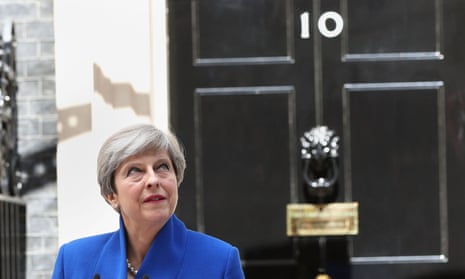When Theresa May called the general election at the end of April, the UK economy was struggling, inflation was on the rise and Brexit talks were looming. Seven weeks later, seemingly nothing has really changed.
The economy is still struggling. May went to the country when Britain was officially the slowest-growing country in the European Union for the first time since the mid-1990s. It was announced during the campaign that inflation had edged up to 2.7%, and Brexit negotiations are supposed to start in a week’s time.
In reality, however, everything has changed. May has been politically wounded, almost certainly fatally, by her failure to secure the whopping mandate that initially seemed possible. She hoped that Michel Barnier, the EU’s chief negotiator, would be impressed by the size of her landslide majority. Instead, she looks weak and vulnerable.
Britain’s EU partners were left baffled by the result of the general election, and no wonder. The Conservatives campaigned for the right to strike a hard bargain and failed to get it. The Liberal Democrats campaigned for a second referendum and failed to get that either. Labour perhaps best captured the confused mood of the voters by insisting that while the result of the referendum should be honoured, the aim should be to continued membership of the single market. Some voters want a clean break. Some voters want Brexit in name only. Some voters want to have their cake and eat it.
May’s position is not helped by the fact that the UK is at the bottom of an economic cycle while the eurozone is going through one of its better periods. There’s no real secret as to why that is. The European Central Bank has belatedly discovered the joys of full-blown quantitative easing and growth has subsequently picked up. In Britain, the stimulus was provided much earlier and the effects have gradually worn off, exposing the long-standing problems of weak productivity and an over-dependence on a booming housing market to support consumer spending.
Growth in the UK is likely to pick up from the 0.2% recorded in the first quarter, but not by much. The weaker pound is underpinning manufacturing but hurting consumption by making imports dearer. Political uncertainty has given businesses another reason to defer investment decisions. Yet the anti-austerity mood and the distinct possibility that there will be a second election before too long suggests that there will be more public spending to boost growth.
But there is little in the economic outlook to give the Conservatives hope of a feelgood factor. On the contrary, living standards will continue to fall for the rest of this year and perhaps longer. In these circumstances, repeatedly telling voters that the economy is strong and stable was asking for trouble.
In reality, this is the most difficult economic position any government has faced since Harold Wilson became prime minister in 1974 with Britain on a three-day week and inflation heading skywards. May faces the most crucial negotiations in Britain’s recent history with a shredded reputation, a divided party, a slowing economy and the clock ticking away.
February 1974 was a good election to lose for the Conservatives. It was Labour that had to deal with the 25%-plus inflation unleashed by the quadrupling of global oil prices during the Yom Kippur war. It was Labour that had to call in the International Monetary Fund for an emergency loan in 1976, and it was Labour that was in power during the winter of discontent.
Indeed, Labour has a history of coming into power after the Conservatives have made a right old mess of things. May has done Jeremy Corbyn a favour by cobbling together a deal with the DUP that keeps her in office, if only just.
Labour could try to piece together a rainbow coalition to allow it to pass legislation, but it would require the unlikely support of every other party, including the DUP. If a minority Corbyn government ever looked like becoming a realistic possibility, the financial markets would take immediate fright. The increased political uncertainty would push the pound lower and inflation higher. Plans for extra government borrowing would lead to interest rates going up. Labour would have to conduct devilishly difficult Brexit talks at a time when people were getting poorer. Far better to let the Tories clear up their own mess.
Here’s the position. There was no clamour for a referendum when David Cameron pledged to hold one. The then prime minister gave the promise to defend has right flank from Ukip. Having called the referendum, Cameron assumed he wouldn’t need to do much to win it and was oblivious to the fact that millions of voters – particularly in the north and Midlands – were deeply unhappy and now had a way of expressing their discontent.
Cameron then resigned as soon as the referendum was lost. May, who had provided only lukewarm support for the remain side during the campaign, was quickly installed as a safe pair of hands. She has proved to be anything but.
The election result leaves her with a huge problem. On the one hand, her lack of an overall majority and the presence in her own ranks of pro-Europeans such as Ken Clarke and Nicky Morgan will make it much harder to get a hard Brexit deal through parliament. On the other, many Conservative MPs would not accept a deal that involved staying in the single market if it meant the government making concessions on the free movement of labour and accepting the jurisdiction of the European court of justice.
The pro-EU wing of the Tory party is small but, just like the DUP, has become more influential in a hung parliament.
May’s position is that “no deal is better than a bad deal”, but that is a slogan not a policy. Strong lobbying from the CBI, the City and international investors will discourage Britain from walking away from negotiations. As George Osborne pointed out on the Andrew Marr Show, a “no deal” outcome would not be acceptable to the DUP because it would mean a hard border between Northern Ireland and the Irish Republic.
Labour, the Lib Dems, the SNP and some Tories would be content with a compromise deal. Many Tories would not be. All the ingredients are there for a Conservative schism not seen since the repeal of the Corn Laws in the 1840s. Then, as now, the Tories were divided, on that occasion between its free trade and protectionist wings. The split damaged the Tory party so badly that it was unable to form a majority government for 28 years. All Labour needs to do is sit back and watch events unfold. As Napoleon once said, never interfere with an enemy that’s in the process of destroying itself.

